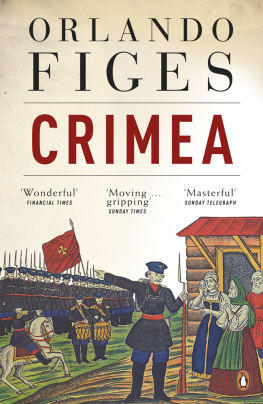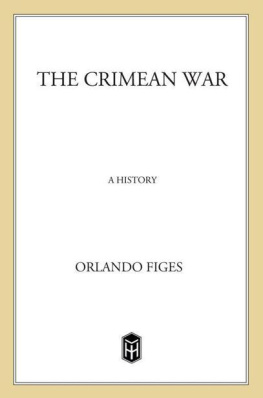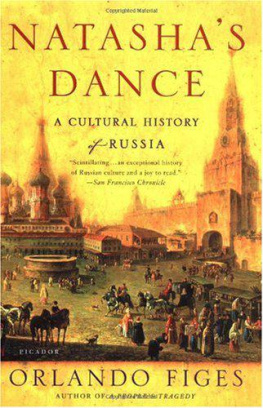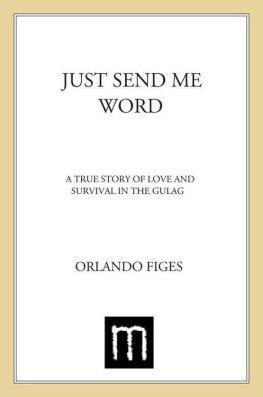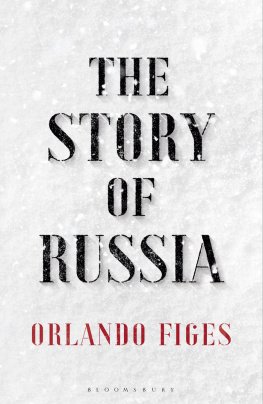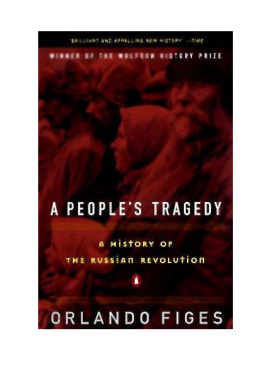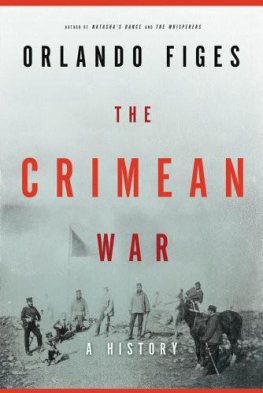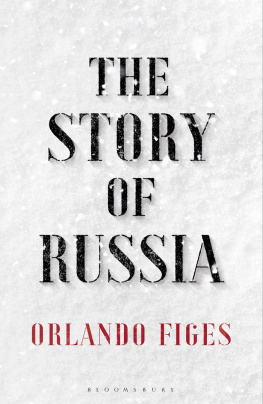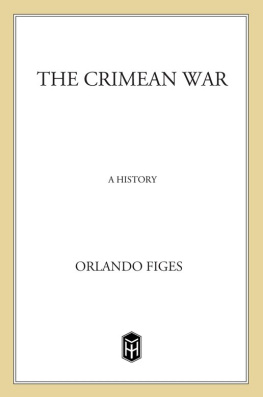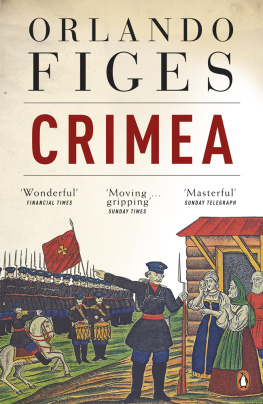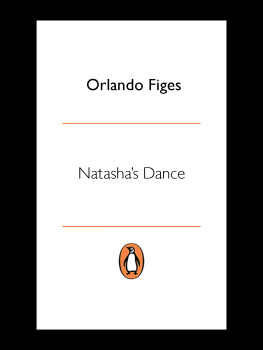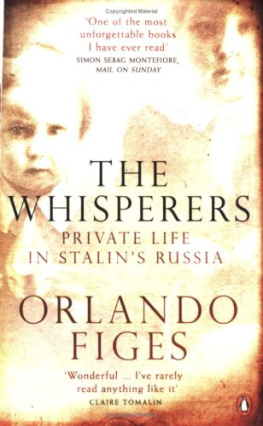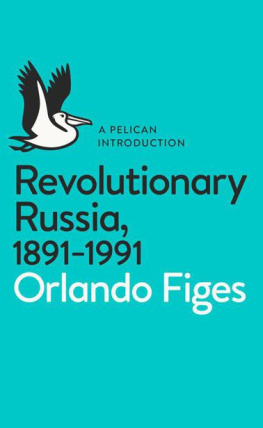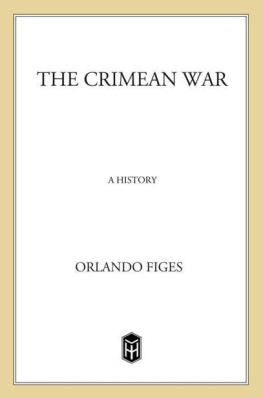ORLANDO FIGES
Crimea
The Last Crusade

ALLEN LANE
an imprint of
PENGUIN BOOKS
ALLEN LANE
Published by the Penguin Group
Penguin Books Ltd, 80 Strand, London WC2R 0RL , England
Penguin Group (USA) Inc., 375 Hudson Street, New York, New York 10014, USA
Penguin Group (Canada), 90 Eglinton Avenue East, Suite 700, Toronto, Ontario, Canada M4P 2Y3 (a division of Pearson Canada Inc.)
Penguin Ireland, 25 St Stephens Green, Dublin 2, Ireland (a division of Penguin Books Ltd)
Penguin Group (Australia), 250 Camberwell Road, Camberwell, Victoria 3124, Australia
(a division of Pearson Australia Group Pty Ltd)
Penguin Books India Pvt Ltd, 11 Community Centre, Panchsheel Park, New Delhi 110 017, India
Penguin Group (NZ), 67 Apollo Drive, Rosedale, North Shore 0632, New Zealand
(a division of Pearson New Zealand Ltd)
Penguin Books (South Africa) (Pty) Ltd, 24 Sturdee Avenue, Rosebank, Johannesburg 2196, South Africa
Penguin Books Ltd, Registered Offices: 80 Strand, London WC2R 0RL , England
www.penguin.com
First published 2010
Copyright Orlando Figes, 2010
The moral right of the author has been asserted
All rights reserved.
Without limiting the rights under copyright reserved above, no part of this publication may be reproduced, stored in or introduced into a retrieval system, or transmitted, in any form or by any means (electronic, mechanical, photocopying, recording or otherwise) without the prior written permission of both the copyright owner and the above publisher of this book
ISBN: 978-1-84-614500-1
For Seren
Acknowledgements
The research for this book took place over many years and thanks are due to a large number of people.
In the early stages of research Helen Rappaport helped me to compile a working bibliography from the potentially endless list of books, published memoirs, diaries and letters by participants in the Crimean War. She also gave invaluable advice on the social history of the war, sharing information from her own research for No Place for Ladies: The Untold Story of Women in the Crimean War.
At the National Army Museum in London I am grateful to Alastair Massie, whose own works, The National Army Museum Book of the Crimean War: The Untold Stories and A Most Desperate Undertaking: The British Army in the Crimea, 185456, were an inspiration to my own. I gratefully acknowledge the permission of Her Majesty Queen Elizabeth II to make use of the materials from the Royal Archives, and am thankful to Sophie Gordon for her advice on the photographs of the Royal Collection at Windsor. In the Basbanlik Osmanlik Archive in Istanbul, I was helped by Murat Siviloglu and Melek Maksudoglu, and in the Russian State Military History Archive in Moscow by Luisa Khabibulina.
Various people commented on all or sections of the draft Norman Stone, Sean Brady, Douglas Austin, Tony Margrave, Mike Hinton, Miles Taylor, Dominic Lieven and Mark Mazower and I am grateful to them all. Douglas Austin and Tony Margrave, in particular, were a mine of information on various military aspects. Thanks are also due to Mara Kozelsky for allowing me to read the typescript of her then unfinished book on the Crimea, to Metin Kunt and Onur nul for help on Turkish matters, to Edmund Herzig on Armenian affairs, to Lucy Riall for advice on Italy, to Joanna Bourke for her thoughts on military psychology, to Antony Beevor for his help on the hussars, to Ross Belson for background information on the resignation of Sidney Herbert, to Keith Smith for his generous donation of the extraordinary photograph Old Scutari and Modern skdar by James Robertson, and to Hugh Small, whose book The Crimean War: Queen Victorias War with the Russian Tsars made me change my mind on many things.
As always, I am indebted to my family, to my wife, Stephanie, and our daughters, Lydia and Alice, who could never quite believe that I was writing a war book but indulged my interests nonetheless; to my wonderfully supportive agent, Deborah Rogers, and her superb team at Rogers, Coleridge and White, especially Ruth McIntosh, who talks me through my VAT returns, and to Melanie Jackson in New York; to Cecilia Mackay for her thoughtful work on the illustrations; to Elizabeth Stratford for the copy-editing; to Alan Gilliland for the excellent maps; and above all to my two great editors, Simon Winder at Penguin and Sara Bershtel at Metropolitan.
Introduction
In the parish church of Witchampton in Dorset there is a memorial to commemorate five soldiers from this peaceful little village who fought and died in the Crimean War. The inscription reads:
DIED IN THE SERVICE OF THEIR COUNTRY .
THEIR BODIES ARE IN THE CRIMEA .
MAY THEIR SOULS REST IN PEACE. MDCCCLIV
In the communal cemetery of Hricourt in south-eastern France, there is a gravestone with the names of the nine men from the area who died in the Crimea:
ILS SONT MORTS POUR LA PATRIE .
AMIS, NOUS NOUS REVERRONS UN JOUR
At the base of the memorial somebody has placed two cannonballs, one with the name of the Malakoff (Malakhov) Bastion, captured by the French during the siege of Sevastopol, the Russian naval base in the Crimea, the other with the name Sebastopol. Thousands of French and British soldiers lie in unmarked and long-neglected graves in the Crimea.
In Sevastopol itself there are hundreds of memorials, many of them in the military cemetery (bratskoe kladbishche), one of three huge burial grounds established by the Russians during the siege, where a staggering 127,583 men killed in the defence of the town lie buried. The officers have individual graves with their names and regiments but the ordinary soldiers are buried in mass graves of fifty or a hundred men. Among the Russians there are soldiers who had come from Serbia, Bulgaria or Greece, their co-religionists in the Eastern Church, in response to the Tsars call for the Orthodox to defend their faith.
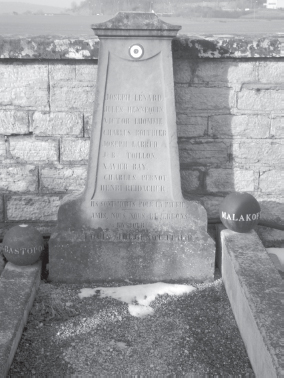
The Hricourt Memorial
One small plaque, barely visible in the long grass where fifteen sailors lie underground, commemorates their heroic sacrifice during the defence of Sevastopol in 18545:
THEY DIED FOR THEIR FATHERLAND ,
FOR TSAR AND FOR GOD
Elsewhere in Sevastopol there are eternal flames and monuments to the unknown and uncounted soldiers who died fighting for the town. It is estimated that a quarter of a million Russian soldiers, sailors and civilians are buried in mass graves in Sevastopols three military cemeteries.
Two world wars have obscured the huge scale and enormous human cost of the Crimean War. Today it seems to us a relatively minor war; it is almost forgotten, like the plaques and gravestones in those churchyards. Even in the countries that took part in it (Russia, Britain, France, Piedmont-Sardinia in Italy and the Ottoman Empire, including those territories that would later make up Romania and Bulgaria) there are not many people today who could say what the Crimean War was all about. But for our ancestors before the First World War the Crimea was the major conflict of the nineteenth century, the most important war of their lifetimes, just as the world wars of the twentieth century are the dominant historical landmarks of our lives.
The losses were immense at least three-quarters of a million soldiers killed in battle or lost through illness and disease, two-thirds of them Russian. The French lost around 100,000 men, the British a small fraction of that number, about 20,000, because they sent far fewer troops (98,000 British soldiers and sailors were involved in the Crimea compared to 310,000 French). But even so, for a small agricultural community such as Witchampton the loss of five able-bodied men was felt as a heavy blow. In the parishes of Whitegate, Aghada and Farsid in County Cork in Ireland, where the British army recruited heavily, almost one-third of the male population died in the Crimean War.
Next page
